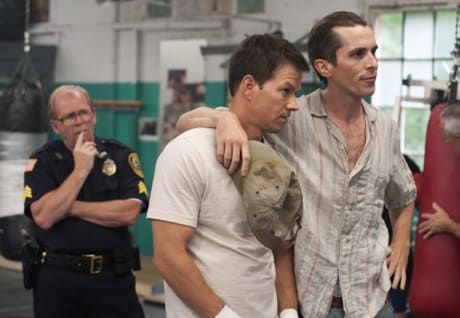In his first appearance as Dicky Eklund (a washed-up boxer who reached his peak when he knocked down Sugar Ray Leonard, though some think Leonard tripped), Christian Bale sits on a couch with his legs jittering, staring at the camera. Then, when he begins to talk to the off-screen director, he fiddles with his arms a little before quickly resting one on top of the couch.
When next we see him, he's ostensibly doing road repairs in Lowell, Massachusetts, but really, he's just goofing around, mugging heavily for brother Micky (Mark Wahlberg) and some assembled neighbourhood friends. And, man, it's some heavy-duty mugging. I considered saying Bale's performance bordered on being too big and Oscar baiting. Of course, then I saw the real-life Dicky in the end credits and he didn't seem so far off.
When The Fighter begins in the mid-'80s, Dicky has been coasting for a while on his reputation as a promising fighter who never made it. When HBO commissions a no-holds-barred documentary on his crippling crack addiction, Dicky relishes the attention (we see him mugging and calling himself "Hollywood" to a bunch of prison inmates just before the documentary airs).
Melissa Leo has a similarly showy role as Micky's ferociously overbearing working-class mother/manager, who along with Dicky, hinders his career as much as she helps. Between these two loud, loud performances (three, actually, if you include Amy Adams as a tough-as-nails girlfriend), Mark Wahlberg is an ocean of calm as Micky Ward, a legendary fighter whose achievements would eventually eclipse his older brother's. When Micky poses for publicity photos for a world heavyweight championship match, Dicky finds a way of sneaking into the side of the frame. Bale manages the same trick during Wahlberg's understated-to-the-point-of-invisible performance. It's hard to remember a lead actor being so generous with the spotlight.
Wahlberg leaves a bit of a hole in the film's centre, truth be told, but The Fighter is engrossing nevertheless. "With the possible exception of the romantic comedy, no film genre is more strictly governed by conventions ― or enslaved by clichés, if you prefer ― than the boxing picture," writes A.O. Scott in The New York Times. The Fighter has all the familial melodrama you might expect from a boxing picture, sans the melodrama.
This is the most stylistically restrained film yet from director David O. Russell (Three Kings, I ♥ Huckabees), who lets his actors do most of the heavy emotional lifting (he tactfully resists any temptation to lay on an over-the-top musical score). The script, too, does the neat trick of seeming to follow every boxing movie cliché about a fighter escaping a destructive family before subverting them in the second half ― none of these characters are "bad" and all of them try, sometimes misguidedly, to do the best for each other. Except, perhaps, for Micky's five sisters.
(Alliance)When next we see him, he's ostensibly doing road repairs in Lowell, Massachusetts, but really, he's just goofing around, mugging heavily for brother Micky (Mark Wahlberg) and some assembled neighbourhood friends. And, man, it's some heavy-duty mugging. I considered saying Bale's performance bordered on being too big and Oscar baiting. Of course, then I saw the real-life Dicky in the end credits and he didn't seem so far off.
When The Fighter begins in the mid-'80s, Dicky has been coasting for a while on his reputation as a promising fighter who never made it. When HBO commissions a no-holds-barred documentary on his crippling crack addiction, Dicky relishes the attention (we see him mugging and calling himself "Hollywood" to a bunch of prison inmates just before the documentary airs).
Melissa Leo has a similarly showy role as Micky's ferociously overbearing working-class mother/manager, who along with Dicky, hinders his career as much as she helps. Between these two loud, loud performances (three, actually, if you include Amy Adams as a tough-as-nails girlfriend), Mark Wahlberg is an ocean of calm as Micky Ward, a legendary fighter whose achievements would eventually eclipse his older brother's. When Micky poses for publicity photos for a world heavyweight championship match, Dicky finds a way of sneaking into the side of the frame. Bale manages the same trick during Wahlberg's understated-to-the-point-of-invisible performance. It's hard to remember a lead actor being so generous with the spotlight.
Wahlberg leaves a bit of a hole in the film's centre, truth be told, but The Fighter is engrossing nevertheless. "With the possible exception of the romantic comedy, no film genre is more strictly governed by conventions ― or enslaved by clichés, if you prefer ― than the boxing picture," writes A.O. Scott in The New York Times. The Fighter has all the familial melodrama you might expect from a boxing picture, sans the melodrama.
This is the most stylistically restrained film yet from director David O. Russell (Three Kings, I ♥ Huckabees), who lets his actors do most of the heavy emotional lifting (he tactfully resists any temptation to lay on an over-the-top musical score). The script, too, does the neat trick of seeming to follow every boxing movie cliché about a fighter escaping a destructive family before subverting them in the second half ― none of these characters are "bad" and all of them try, sometimes misguidedly, to do the best for each other. Except, perhaps, for Micky's five sisters.




